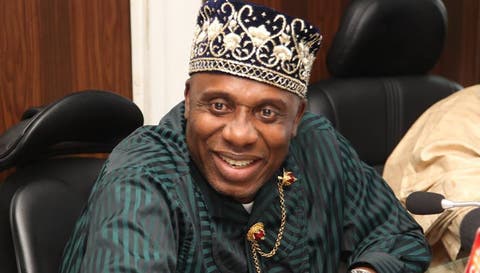Okechukwu Nnodim and Joseph Olaoluwa
The Federal Government on Monday announced that it had signed a Memorandum of Understanding with Mota-Engil Group for the construction of the $1.959bn Kano-Maradi standard gauge rail project.
Minister of Transportation, Rotimi Amaechi, signed on behalf of the Federal Government, while the Managing Director, Mota-Engil, Antonio Gvoea, signed on behalf of the contracting firm.
However, pan-Yoruba sociocultural group, Afenifere, kicked against the move, saying that with so much deficit in the country’s transport infrastructure, the government was headed the wrong direction with the rail project.
The $1.96bn Kano-Maradi rail line connects Nigeria and Niger Republic.
The Director, Press and Public Relations, Federal Ministry of Transportation, Eric Ojiekwe, said in a statement issued in Abuja that the new railway corridor, located in Northern Nigeria and Maradi in Niger Republic would run through three states.
He outlined the states as include Kano, Jigawa and Katsina, adding that it would go through the territory Niger Republic as far as Maradi.
“Other cities that will be affected by the rail line in Nigeria are Danbatta, Kazaure, Daura, Mashi, Katsina and Jibiya,” the FMT said.
It added, “The 283.75km rail line, besides developing freight and passenger transport as it will be integrated with road transport, will make great contribution to the local economy.”
The ministry said the project would also contribute in developing the social sector.
It said the project duration was for 36 months and the contract type was engineering, procurement and construction.
The signing ceremony was also witnessed by the ministry’s Permanent Secretary, Magdalene Ajani; Director, Legal Services, Pius Oteh; Head of Legal, Mota-Engil Group, Cameron Beverley; and Magajin Garin Kano, Muhammad Wada; among others.
The Publicity Secretary of, Afenifere, Yinka Odumakin, told our correspondent that many Nigerians were against the move by government to construct the rail line.
He said it was unfortunate that the President, Major General Muhammadu Buhari (retd.), was more interested in constructing a project outside Nigeria than in developing roads within Nigeria.
Odumakin said, “It is an unfortunate development. We know the state of Nigerian roads. We know that our roads are in a very bad shape, for instance, look at the Lagos-Ibadan Expressway, the roads to the East, to Port Harcourt and the rest of them.
“They are not Buhari’s priority; rather his priority now is the line to Maradi in Niger Republic. They are more interested in their kith and kin who are Fulanis outside Nigeria than in Nigeria itself.”
He added, “It is unfortunate. So the Afenifere and many other Nigerians out there are not in support of this initiative. In fact, how can we support it?”
A Public Affairs analyst, Bala Zakka, argued that it was more economical to decongest Apapa ports than to construct a rail line to its Niger counterpart.
He said, “It would make more sense if you construct a rail line out of Apapa to the hinterland so that trucks can be cleared from Apapa. It is better you take cargoes to Edo State or Osun State than everybody comes into Apapa.
“What would be beneficial to me as a Nigerian is to decongest Apapa via rail than going to Maradi. It is 10 times economical for you have railway out of Apapa to places out of Lagos. This will lead to development in other states.”
The analyst said that the government has continued to ignore the advice of technocrats, and the best time to have dealt with this issue was when it was still itemised for consideration. Zakka said what was left was to wait and see the effects of the policy.
Similarly, a professor of economics at the Olabisi Onabanjo University, Ago-Iwoye, Ogun State, Prof. Sheriffdeen Tella, advised the government to focus on cargo now that the deal had been signed.
He said, “Rail project is very important as part of the transport infrastructure. My only worry is that the government is more concerned about passengers than goods. Whereas it is better to have the rail constructed so it can move goods because moving goods via rail is very important.
“It is more important to consider trains that will move cargo which will decongest our roads.
“What the government has been doing has been light rail. Light rail cannot carry cargo and the government is doing light rail. The government must also make sure that whatever is spent on the project is recovered.”
The university don said the best way it can be recovered was via cargo operations. He asked that the government should do a rail for cargo which can be utilised for human beings and goods. (PUNCH)














